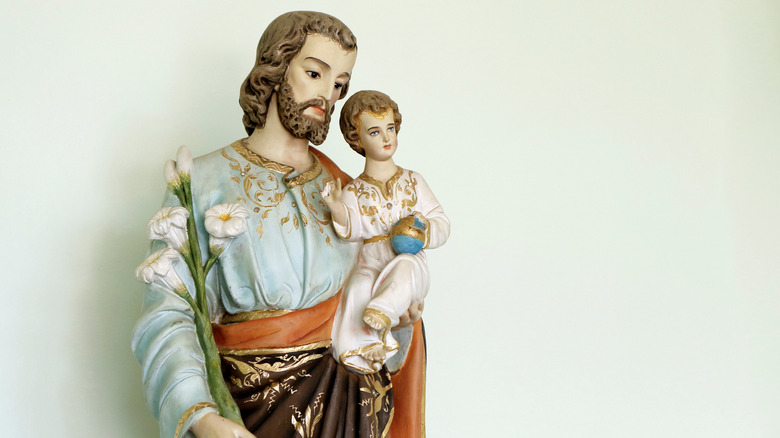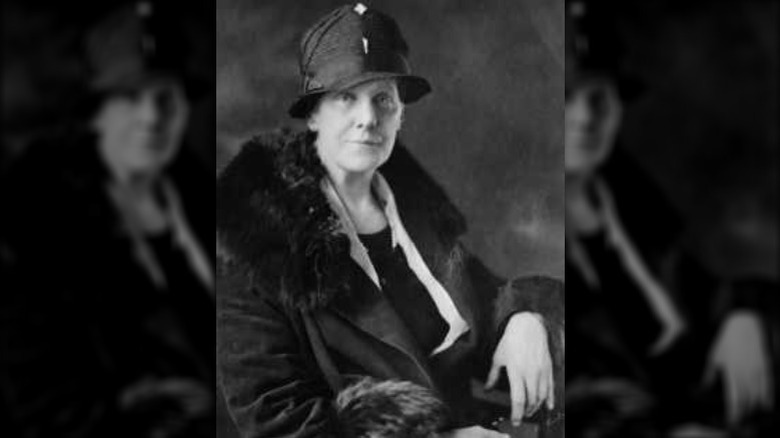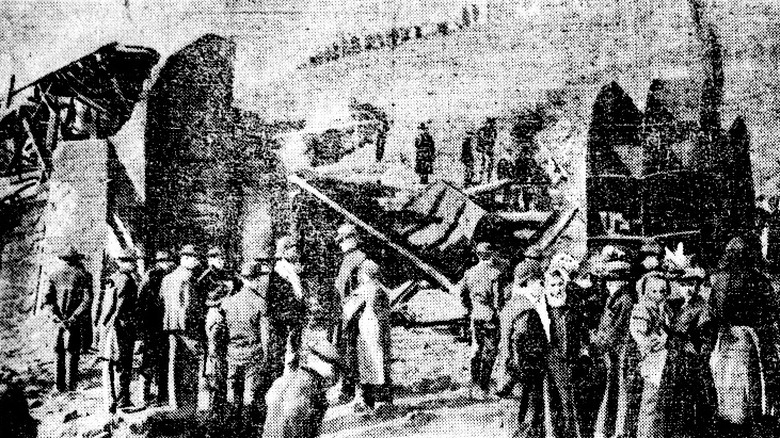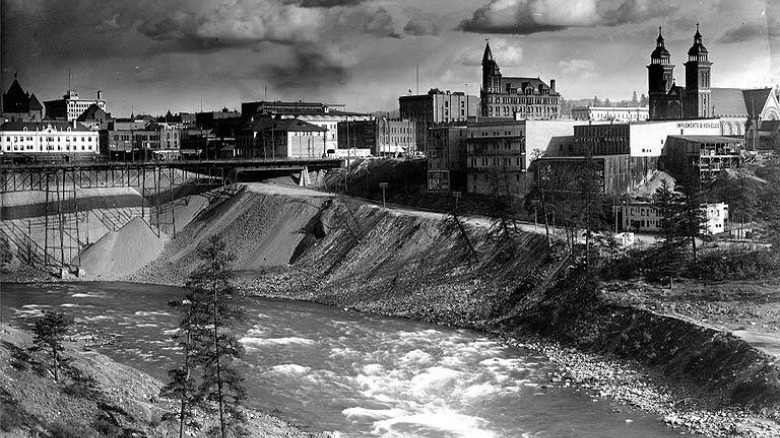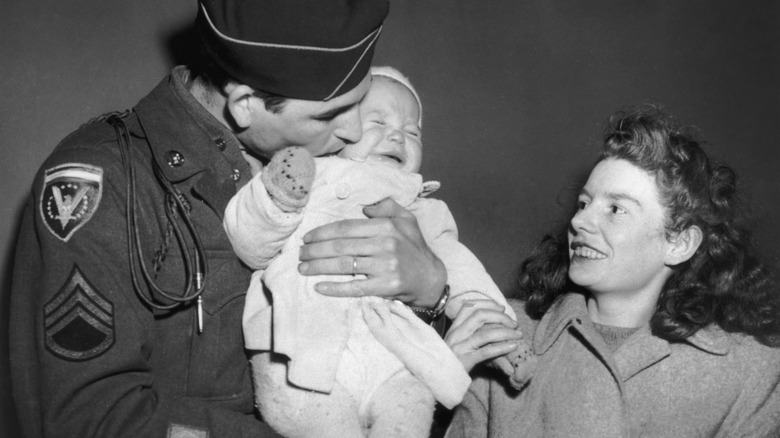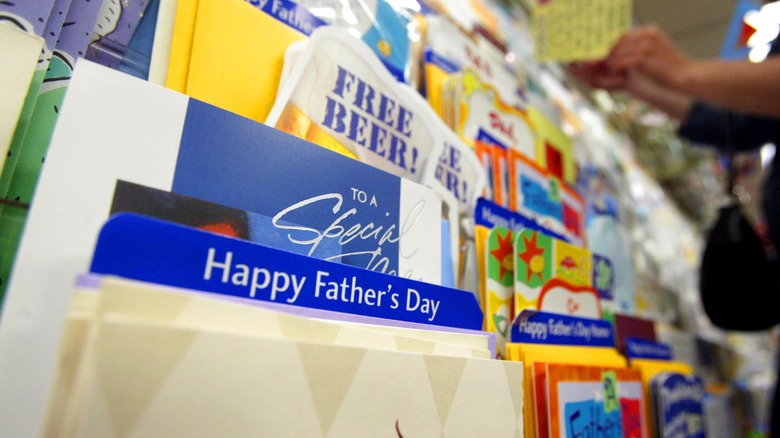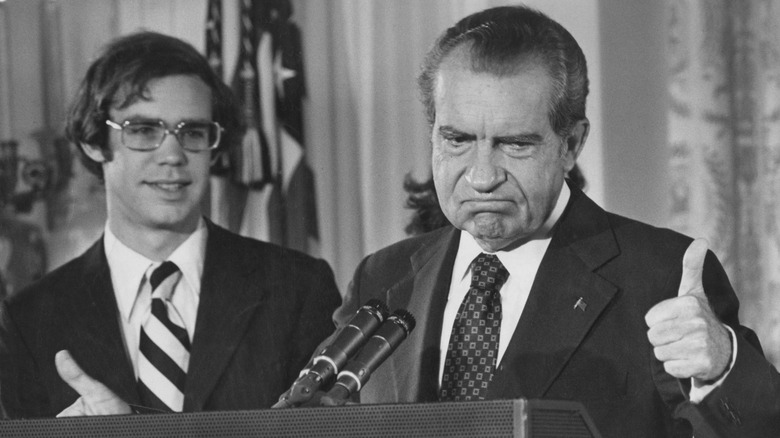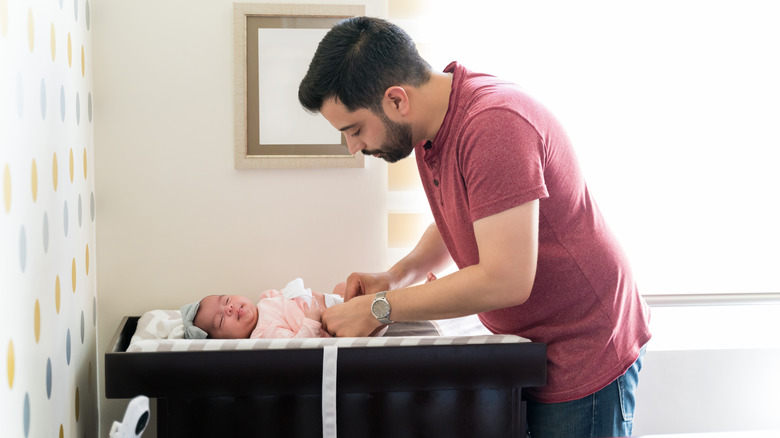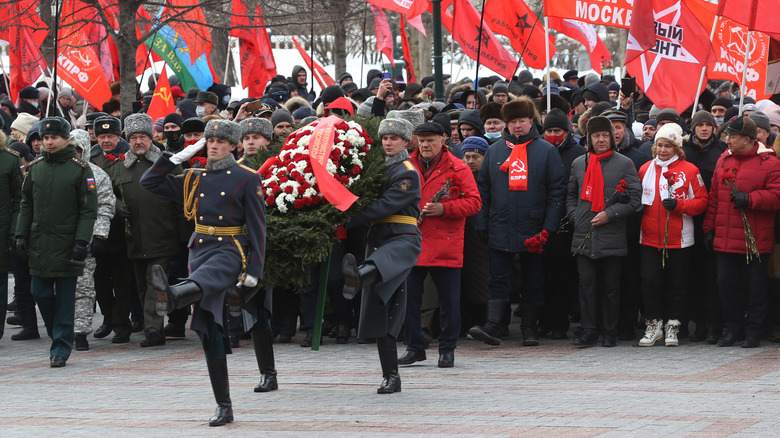The Controversial History Of Father's Day
Father's Day is the natural follow-up to Mother's Day. We modern people don't really question its existence beyond it being a reason to call Dad, cook steak, and go on a shopping spree at Home Depot. So it's kind of weird to think that Father's Day actually has a controversial history, but it does. For a long time Dads were like, "I don't need any flowers or recognition for existing in my God-given role as the guy who works 9 to 5 and then spends his evenings loafing around on the couch while his wife makes sure he doesn't notice he has children." Because you know, that kind of was fatherhood for way too much of history. And let's face it, it does actually seem kind of dumb to honor someone for doing something that he's not actually doing.
Dads have changed a lot since the middle of the 20th century, though. Today's dads change diapers, cook dinner, go to ballet recitals, take the kids shopping for school clothes — real dads do it all, and no one would ever say they don't deserve a special day as much as moms do. But it was kind of a long road to get from sperm donor who doesn't do much fathering to the super dads of today, and Father's Day kind of just evolved alongside dads. Here's how it happened.
Father's Day does go back a long way, sort of
Father's Day as we know it hasn't really been a thing for very long, but some version of it did exist in the olden days. According to Ancestral Findings, the Catholics were honoring dads as early as 1508, which is the first known mention of a St. Joseph's Day celebration that took place in Southern Europe. St. Joseph, as you recall, is the guy who raised Jesus as his own even though the whole virgin birth thingy made it pretty clear that he was not biologically connected to his wife's child.
There's also some evidence that earlier factions of the Christian church also celebrated St. Joseph's Day, possibly as early as 400 AD. But this was centuries before Home Depot, so it probably wasn't the same sort of celebration it is today. In fact, the celebrants seem to have spent more time talking about dead fathers like Adam and Abraham than living fathers, so for dads, St. Joseph's day was really more like "here are the ancient biblical standards of fatherhood" rather than "here is a new tie and a set of socket wrenches." There probably was food, though, so at least dads could absorb the message of biblical fatherhood with a venison steak and a cup of mead or something.
Mother's Day, on the other hand, was never controversial
To understand the controversy behind Father's Day, you first have to understand the original nature of Mother's Day. In the early 20th Century, Mother's Day was kind of thought of as the one day out of 365 that families took time to appreciate everything that moms do. Dads, naturally, got to lay claim to the other 364 days, so no one really thought about inventing Father's Day because every day was Father's Day. Dads did all the important stuff, like putting on fedoras and spending their day at "the office." What moms did wasn't unimportant, but you know, cumulatively it was like 1/365th as important as what dads did.
So when Anna Jarvis proposed a holiday honoring moms, dads were all, "That's great! Now my wife will no longer have a reason to wish for a career or the ability to open a credit card account without my signature, because she gets a whole day that's just about her and that more than makes up for a lifetime of not really being taken seriously." And so, according to the Old Farmer's Almanac, Mother's Day became a thing in 1907 without really any controversy at all because hey, it was the least society could do instead of granting women the right to become doctors or politicians or choose not to get married and have children if that's how they decided to live their lives. Totally worth it.
If you don't count St. Joseph's Day, this was kind of the first Father's Day
Grace Golden Clayton was the first person to propose a formal Father's Day service, but it wasn't because she thought dads needed more ties or greeting card companies needed more reasons to sell overpriced pieces of folded cardstock bearing embarrassingly sentimental poems or moustache motifs. According to the Old Farmer's Almanac, it was because hundreds of people in Clayton's town had just died in the worst mining accident in American history. In December of 1907, an explosion in a Monongah, West Virginia coal mine killed more than 350 people. Some of them died in the blast, others suffocated on poisonous gases. Many of them left fatherless children behind. Some of them died with their children since at the time it wasn't uncommon for boys to accompany their fathers into the coal mines.
"It was partly the explosion that set me to think how important and loved most fathers are," Clayton explained during an interview with a local newspaper. "All those lonely children and the heart-broken wives and mothers, made orphans and widows in a matter of a few minutes."
Unsurprisingly, this version of Father's Day wasn't a celebration — instead, it was a church ceremony held on July 5, 1908. And it didn't become an annual tradition, either. Still, the sentiment was there, and it was only a year later that the idea started to solidify in at least one other woman's imagination.
The next father's day honored just the one dad
Even way back in the time before Home Depot, there were some families that didn't conform to the ideal of Dad goes to work and Mom does everything else. Sometimes families lost a parent, and the surviving spouse stepped in to fill the role of both mother and father. It was a person like this who inspired Sonora Smart Dodd to advocate for a day honoring fathers — according to ABC News, her dad was a Civil War veteran whose wife died in childbirth, leaving him to raise six children on his own.
Instead of rushing into a new marriage with a replacement child-rearer, William Jackson Smart did all the child rearing himself and seemed to handle it just fine — or maybe not, we don't really know. Maybe he was secretly hiding behind a couch eating whole pints of Ben and Jerry's while the kids drew all over the walls with Sharpie and threw Goldfish crackers at each other, and Sonora just never gave anyone the details. Anyway, she did think her dad deserved a special day for all of his hard work, so in 1909, Sonora asked the Ministerial Association in her hometown of Spokane, Washington, to consider giving a sermon in honor of dads on June 5, her father's birthday. But the ministers wanted a little more time between Mother's Day and Father's Day, so they proposed the third Sunday in June and that's how it's been ever since.
So what was the problem?
The first Father's Day was, by all accounts, a lovely occasion with boys honoring their dads with lapel flowers and Sonora bringing gifts to the wheelchair-using dads of the city. So why didn't this new tradition catch on right away? Toxic masculinity, mostly. As it turned out, many of the would-be guests of honor didn't want to be guests of honor because they thought Father's Day would just be like a gender-fluid Mother's Day or something and they would have to accept gifts of flowers and boxes of heart-shaped chocolates and then their man parts would get smaller. Evidently, it didn't actually occur to any of them that they could just, you know, ask for not-feminine stuff for Father's Day.
According to the Old Farmer's Almanac, the idea spread across the United States, but it took a really long time for dads to get over this weird complex that Father's Day was just Mother's Day for men who were insecure in their own masculinity. It seems that the idea that dads should be honored every single day except for Mother's Day and therefore didn't need a special day with their name on it was kind of a hard one to shake, and it took a lot of persistence and gradual adoption of the idea by a lot of important people before the world's men finally went, "Hmm, maybe my man parts won't get any smaller and I sure could use a set of socket wrenches."
Death and money are the two great equalizers
Eventually, the nation's dads started to come around, but not without a little outside help. First, according to The Old Farmer's Almanac, there was the Great Depression, when a lot of dads did become closer to their kids because they were spending more time in the home. But it was mostly economics that spurred on Father's Day at that time in history. You see, the powers that be latched on to pretty much any reason they could think of to get people to pump money back into the economy, and one way to do that was to promote a holiday where everyone was expected to buy a gift. So you know, never mind that your wife is making a casserole for your family of six out of a tin of baked beans and some sawdust, surely you've got a few nickels tucked away that can be spent on a couple of silk ties, right? Logic.
Years later, World War II played a part in making Father's Day a thing, simply because of the huge number of young dads who had gone overseas to fight in the war, leaving moms alone with very young children. During that moment in history, Father's Day was touted as a way for families to connect with and appreciate their far-away loved ones. It also gave everyone yet another excuse for a party when the war ended and those young dads finally got to come home.
Show me the money, I mean the love
By the 1930s, Mother's Day was turning into Christmas only with more brunch and fewer pine trees. Retailers knew they could guilt pretty much anyone with a mom into buying a greeting card and a bouquet of flowers, and the holiday was proving to be a nice little oasis of cash strategically positioned between last Christmas and the next one. So when retailers got wind of this Father's Day idea, they were like "heck yeah, bring on the money ... I mean the love and appreciation for fathers all over the nation." The National Dry Goods Retail Organization was especially keen on the idea, probably because they were the world's most boring organization and they really needed to get behind an exciting cause so their members wouldn't always be falling asleep three sentences into their super boring annual report. According to Refinery29, The National Dry Goods Retail Organization vowed to make Father's Day as big a thing as Mother's Day, and they were soon joined by other retailers with equally boring names and eventually they decided to form the National Council for the Promotion of Father's Day, because they still hadn't learned any lessons about how not to give their organizations boring names.
Anyway, the council did a pretty good job promoting Father's Day and by the time it was officially recognized it was already a commercial success.
Who did make it official anyway?
While men all over the nation were moaning about having this girlish holiday forced upon them, politicians were using the idea as a way to make themselves look like modern thinkers to — who else — the voters. In 1916, President Woodrow Wilson celebrated the holiday and even did some weird flag unfurling thing that was part Father's Day celebration, part "check out how I can press this button in Washington, D.C. and it unfurls a flag in Spokane." Calvin Coolidge took up the cause eight years later in 1924, when he signed a proclamation that basically just said he thought men should step up and be better dads.
Still, the idea didn't really go beyond that, at least not in an official capacity, until 1966, more than half a century after Sonora Smart Dodd first came up with the idea. According to Teen Vogue, Lyndon B. Johnson signed an executive order declaring that Father's Day should be celebrated on the third Sunday in June. That still wasn't quite official, though, and it was actually Richard Nixon who finally officially signed Father's Day into law. So basically, while he wasn't spying on his political enemies and declaring his not-crookdom to the world at large, Nixon was supporting the nation's dads by signing stuff, and it might have had more to do with caring whether or not Americans liked him then whether or not he was really a champion for the nation's dads.
When dads finally stepped up and became dads
Eventually, dads in America warmed up to the idea of having a special day just for them, and gift givers did figure out that dads don't want flowers and they only want chocolates if they can steal them out of their wife's heart shaped box of candy while she's busy changing diapers. Father's Day kind of went on like that for a while, until people finally started going, "Hey, what if fathers, you know, acted more like mothers?"
According to Time Magazine, the role of the American dad finally started to change in the 1960s, at the same time as the women's movement was normalizing employment and careers for women. As women started making inroads in the workplace, men started making inroads in the home. It was no longer considered unmanly to change a diaper or wash the dishes or do a load of laundry and cook something in a pot instead of on a barbecue. In fact, a sort of reversal of sentiment happened; now men who didn't step up as fathers and equal partners within the home were actually considered less manly.
All of that changing sentiment helped make Father's Day more of an obvious parallel to Mother's Day. Now that fathers were equal parenting partners, it seemed pretty natural that they should also get their own day to celebrate their hard work as role models and child rearers.
Russia just has Men Day
Today, Father's Day is celebrated all over the world. In a lot of countries, it looks pretty similar to the American version of the holiday — third Sunday of June, big spike in tool and tie sales, steak dinners, and probably also some things that aren't total stereotypes. But not every country celebrates Father's Day. Russia, for example, just has Men Day because they don't want to leave out all those guys who work hard to nurture and support just themselves and maybe a dog or something.
According to Time, Russia's version of the holiday is called "Defender of the Fatherland Day," and it's mostly a military celebration and day of parades held in honor of all the enlisted men who work hard to defend Russia from her enemies and people who say mean things about Putin. But since not all men in Russia are enlisted, the powers that be didn't want anyone with a Y chromosome to feel left out, so they expanded the holiday to include all men. Traditionally, on Defender of the Fatherland Day the women in a man's life are supposed to give him small gifts. To be fair, Russia does have Mother's Day and also an equivalent International Women's Day, which falls on March 8. So it's not like it's all men, all the time over there.
'Special Person's Day,' though?
There's always someone, somewhere who wants to poop all over everyone's party. According to the Old Farmer's Almanac, in the 1920s and 1930s there were people who loudly complained that there shouldn't be a Father's Day and there shouldn't be a Mother's Day, either, instead there should just be a "parent's" day. It's not super clear why this would be an advantageous way to do things because if the day is meant to celebrate both parents at the same time, then which one of them is supposed to bake the cake and cook the meal and wrap the presents and which one of them gets to actually take the day off? To be fair, though, even way back then the push for "Parent's Day" was probably more about making sure that kids without moms or dads wouldn't feel the sting when those days came along and they had to face them with an empty chair.
Even today there are still occasional calls to change one or both days into something else. According to the Independent, in 2017 an Australian activist wanted to rename Father's Day "Special Person's Day," to make it more inclusive for kids who are being raised by grandparents, gay or lesbian parents, older siblings, etc. Which makes a certain kind of sense but come on, "Special Person's Day?" Surely the world can come up with a less dumb name for a holiday than that.

